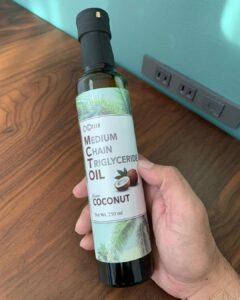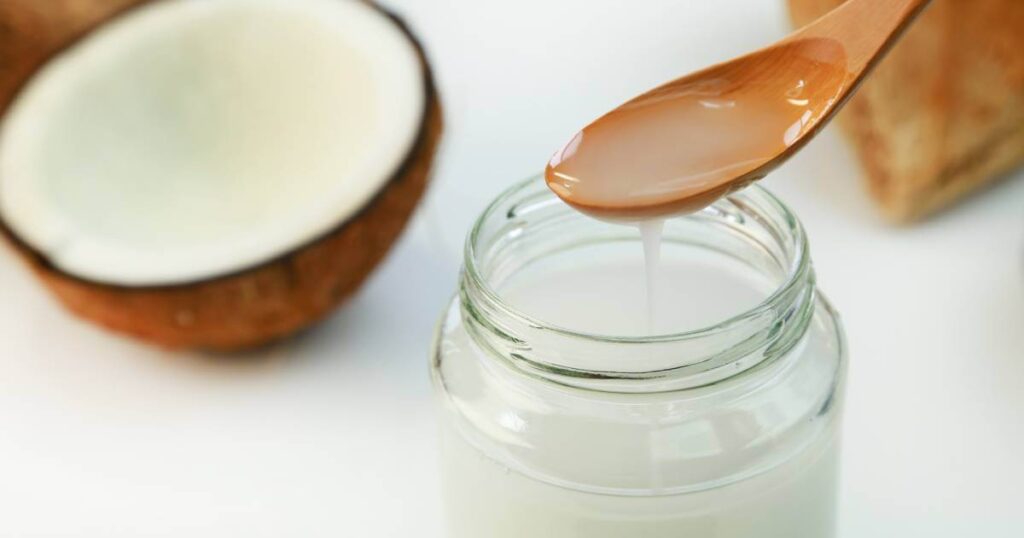Is coconut oil good in smoothies?
Table of Contents
Adding coconut oil and my favorite protein powder to my breakfast smoothie has been a game-changer for me!
Coconut oil in smoothies adds a healthy fat to my diet allows me to stay full longer, and the unique flavor is delicious.
It’s a simple tweak that transforms my morning routine and gives me energy for the day.
Is coconut oil good to put in a smoothie? Let me tell you all of the reasons why it’s so great!
Why is coconut oil such a popular ingredient in smoothies
Coconut oil in smoothies is a must-have ingredient for several reasons:
- Its unique combination of healthy fats and medium-chain triglycerides (MCT) can help boost energy levels while promoting weight loss.
- The oil’s subtle nutty flavor and smooth texture make it the perfect addition to any smoothie recipe.
MCT oil benefits

Medium-chain triglycerides (MCTs) are fats quickly digested and absorbed by the body. Unlike long-chain triglycerides (LCTs), typically stored in the body’s fat cells, MCTs go straight to the liver, where they are quickly converted into ketones, energy used by the brain and body.
This makes MCT oil a popular choice for those following a ketogenic diet or seeking a quick energy source.
Additionally, MCTs have been shown to have potential health benefits such as improving cognitive function, reducing inflammation, and aiding in weight loss.
This means you get an energy boost when you put coconut oil in your smoothies. It’s like adding fuel to help you run longer or think clearer.
Coconut oil Nutritional Facts
While coconut oil is high in fat, coconut oil does not contain cholesterol. It’s all about the good fats and how they help you feel full and energized.
Besides fats, coconut oil offers some vitamins and minerals, too. It has vitamin E, which is excellent for skin health. Vitamin K is also present; it helps with blood clotting when you get a cut or scrape. And let’s not forget iron – important for carrying oxygen around your body!
Here’s what you’ll find in coconut oil:
- Lots of MCTs
- No cholesterol
- Zero fiber
- Vitamins like E and K
- Minerals such as iron
Remember, even though it’s packed with nutrients, moderation is vital because of its high-fat content.
By adding coconut oil to smoothies, you’re making them creamy and delicious and giving yourself a nutrient boost without overloading on unwanted stuff like cholesterol or extra carbs.
| Nutrient | Amount per Serving | % Daily Value |
|---|---|---|
| Total Fat | 14g | 22% |
| Saturated Fat | 12g | 60% |
| Trans Fat | 0g | 0% |
| Polyunsaturated Fat | 0.2g | |
| Monounsaturated Fat | 0.8g | |
| Cholesterol | 0mg | 0% |
| Sodium | 0mg | 0% |
| Total Carbohydrates | 0g | 0% |
| Dietary Fiber | 0g | 0% |
| Sugars | 0g | 0% |
| Protein | 0g | 0% |
| Vitamin D | 0IU | 0% |
| Calcium | 0mg | 0% |
| Iron | 0mg | 0% |
| Potassium | 0mg | 0% |
*Note: The % Daily Values are based on a 2,000 calorie diet. Your daily values may be higher or lower depending on your calorie needs.
What you should and shouldn’t pair coconut oil with for maximum nutritional value
When adding coconut oil to your smoothies, it’s wise to think about what goes well with it. You want your drink to be both tasty and good for you. Here are some tips on what to mix:
Berries, like strawberries or blueberries, are a great choice because they’re full of fiber. This helps balance the nutrition in your smoothie.
The fat in the coconut oil aids the body absorb and utilize the nutrients in the berries more effectively, leading to better overall nutrient uptake.
But watch out! It’s best not to put too many foods with lots of saturated fat into your smoothie and coconut oil. That could be too much of one kind of fat at once.
To make a delicious smoothie, try putting in greens like spinach or kale and protein like yogurt or almond milk. This mix gives you a good balance of nutrients, essential for staying healthy.
Good things to combine with coconut oil in smoothies:
- High-fiber fruits (like berries)
- Greens (spinach, kale)
- Proteins (yogurt, almond milk, hemp hearts)
- Check out this orange and red bell pepper recipe
Things to avoid mixing with coconut oil:
- Lots of high-saturated fat ingredients
You’ll get more nutrition from your smoothie ingredients by following these ideas.
This is known as bioavailability. Bioavailability measures how well nutrients are absorbed and used by your body, and by pairing certain nutrients together, you can increase their bioavailability and enhance their overall nutritional benefits.
If you’re wondering what is the best oil for smoothies? Coconut oil should be at the top of your list. This is because coconut oil helps make certain nutrients soluble and so they care more easily absorbed by your body.
Best substitute for coconut oil in smoothies
Avocado creaminess
Try avocado if you’re looking for a smooth, creamy texture and healthy fats. It contains all essential medium-chain triglycerides, like coconut oil, which boosts your energy. Additionally, avocados are rich in vitamins and minerals, such as potassium, vitamins K, E, C, and B6, which can support overall health and wellness.
Nutty almond butter
Almond butter is another intelligent pick. It adds a delicious flavor to your drink. Plus, it has vitamin E, which is good for your skin.
A spoonful of almond butter can change up your smoothie game. It mixes well with fruits like bananas or berries, too.
Protein-packed yogurt
Greek yogurt or skyr gives you protein and helpful probiotics without much fat. Your smoothies will be richer, but still healthy.
Adding Greek yogurt means more protein in every sip! This can help after workouts or when you need an extra boost during the day.
Remember these options next time you mix a drink:
- Avocado: creamy and heart-friendly.
- Almond butter: nutty taste plus vitamin E.
- Greek yogurt or skyr: more protein with good bacteria.
Best ways to add coconut oil in your smoothies
Warm liquid trick
Some people see coconut oil in it’s solid state and wonder how can you mix coconut oil in drinks? To avoid clumpy smoothies:
- Melt your coconut oil first.
- Heat up a liquid like almond milk or coconut water until warm.
- Blend the solid coconut oil into this warm liquid before adding it to your smoothie.
This method ensures that your coconut oil mixes well. It will create a smooth texture instead of leaving unpleasant lumps in your drink.
Another quick and easy way to liquify your coconut oil before adding to your smoothie is to put it into a little mug in the microwave for a few seconds.
And finally you can look for a MCT oil product which is typically liquified already and super easy to pour.

Flavor first
Remember, virgin coconut oil gives you the most natural flavor; it has been pressed from coconut meat and undergone no further processing, so it keeps that fresh and tropical taste.
When you start with virgin coconut oil, you get the health benefits and an authentic touch to your smoothie’s flavor profile.
Start small
It’s best to begin with a small amount of coconut oil in smoothies. You can use about one teaspoon at first. Add another teaspoon if you enjoy the taste and want more health perks. Listen to how your body feels after drinking these delicious blends.
Increasing gradually lets you find the perfect balance for flavor and wellness benefits without overpowering other ingredients’ tastes.
I personally put a tablespoon into a single-serving smoothie for myself.
How to make coconut oil smoothies (For beginners)
- You’ll need one fresh or frozen banana, fresh or frozen spinach, coconut water, and coconut oil.
- Melt coconut oil gently before blending.
- Combine all ingredients together in your blender
- Taste test and adjust.
- Enjoy your delicious and nutritious smoothie!
Many delicious add-ins would go well with a banana, spinach, and coconut smoothie. Here are a few recommendations:
Protein powder
A scoop of your favorite protein powder can help make your smoothie more filling and give it extra nutrition.
Chia seeds
Chia seeds are an awesome source of fiber and protein and can help thicken your smoothie.
Nut butter
Adding a spoonful of almond or peanut butter can give your smoothie a creamy texture and add some healthy fats.
Frozen fruit
Adding some frozen berries or mango chunks can give your smoothie a sweet and refreshing flavor.
Cinnamon
Sprinkle some cinnamon to add a warm and cozy flavor to your smoothie, which may also help regulate blood sugar levels.
Vanilla extract
A splash of vanilla extract can improve the flavor of your smoothie and give it a slightly sweet taste.
Three easy coconut oil smoothie recipes
Pineapple mango and banana smoothie recipe
Ingredients
- 1 cup frozen pineapple chunks
- 1 cup frozen mango chunks
- 1 frozen banana, peeled
- 1 cup almond milk or coconut water
- 1 tablespoon melted coconut or MCT oil
Instructions
- Gather your frozen fruits: pineapple, mango, and banana.
- Pour a cup of almond milk or coconut water into your blender.
- Add the frozen fruit to the blender.
- Add a spoonful of melted coconut or MCT oil to the blender.
- Blend all the ingredients until smooth and creamy.
- Pour the smoothie into a glass.
- Serve immediately and enjoy your refreshing smoothie.
Kale Apple and Ginger Smoothie Recipe
Ingredients
- 2 fresh kale leaves
- 1 apple, cored and quartered
- 1 teaspoon lemon juice
- 1/4 inch chunk of ginger root, peeled and chopped
- 1/4 cup coconut water
- 1 teaspoon MCT oil
Instructions
- Wash the kale leaves and remove the tough stems.
- Cut the apple into quarters and remove the core.
- Peel and chop the ginger root.
- Add the kale leaves, apple quarters, ginger root, lemon juice, coconut water, and MCT oil to a blender.
- Blend all the ingredients until smooth and creamy.
- If the smoothie is too thick, add more coconut water until you reach the desired consistency.
- Pour the smoothie into a glass and serve immediately.
- Enjoy your delicious smoothie!
Mixed berry and spinach smoothie recipe
Ingredients
- 1/2 cup frozen mixed berries
- 2 cups fresh spinach or 2 frozen spinach nuggets
- 1 tsp chia seeds
- 1/2 cup plain Greek yogurt
- 1/4 cup coconut water or almond milk
- 1 tsp MCT oil
Instructions
- Pour 1/4 cup coconut water or almond milk into a blender.
- Add 1/2 cup plain Greek yogurt to the blender.
- Add 2 cups fresh spinach or 2 frozen spinach nuggets to the blender.
- Add 1 tsp chia seeds to the blender.
- Add 1/2 cup frozen mixed berries to the blender.
- Add 1 tsp MCT oil to the blender.
- Blend everything together gradually on high speed until smooth and creamy. 8. Pour the smoothie into a glass and enjoy immediately.
Tips:
- You can add a sweetener of your choice like honey or maple syrup if you prefer a sweeter smoothie.
- You can swap the coconut water or almond milk for regular water or any other milk of your choice.
Check out our mega list of 20+ banana smoothie recipes add a teaspoon of MCT oil to any of these recipes for an added energy boost.
Should you eat coconut oil if you are concerned about:
Weight management
If you’re watching your weight, coconut oil in smoothies can be tricky. It’s high in calories, so use it sparingly. But a little bit can go into your smoothies without much worry.
- Moderation is important
- Good for keto diets
- Watch those portions!
A ketogenic diet might help with weight loss; coconut oil fits right in.
But remember, too much could lead to weight gain. So keep an eye on how much you add to your smoothies.
Diabetes care
When diabetes is a concern, pick virgin coconut oil. It doesn’t have extra sugars or bad stuff that refined oils might have. Mix it with foods that don’t raise blood sugar fast.
- Choose unrefined/virgin types
- Pair with low-GI foods
Talk to your doctor first, though! They’ll tell you how it affects your insulin and what’s safe for you.
Pregnancy nutrition
During pregnancy, energy is vital, but sugar spikes aren’t good. Coconut oil in smoothies gives energy smoothly because of the MCTs, which also help make essential hormones like HGH and testosterone, reducing cortisol levels during this time.
- Gives steady energy
- Positive impact on hormone production
But please check with a doctor before adding new oils when expecting a baby.
Digestive wellness
The MCTs in coconut oil improve digestion because they fight off harmful microbes. Start small, though; too much at once could be bad for the stomach.
What’s the environmental impact of producing coconut oil?
Coconut farming
It is worth noting that coconut farming, while a lucrative industry, can harm the environment. Forests are often cleared to cultivate more coconut trees, leading to deforestation. This practice is problematic as trees are crucial in maintaining a healthy ecosystem.
When you choose coconut oil, look for fair-trade labels. These brands care about nature and people who farm coconuts. They make sure farms don’t harm forests.
Carbon footprint
Shipping coconut oil far away causes pollution. This pollution comes from ships and trucks carrying oil across oceans and roads.
If you buy local brands, they don’t travel as far. So they make less pollution. Always think about how far your coconut oil has come when you shop.
Look for these things:
- Brands with a fair-trade label.
- Oil is made close to where you live.
Common myths about coconut oil
Quality variance
You might think all coconut oil is the same. But how it’s made really matters. Refined oils are processed with heat and sometimes even chemicals. This changes their natural state and may remove some of the benefits.
On the other hand, virgin coconut oil is less processed.
- Refined coconut oil, often treated with heat, can have fewer nutrients.
- Virgin coconut oil: Made from fresh coconuts, it retains more natural goodness.
Remember, when you choose your smoothie ingredients, quality counts!
Cure-all claims
Some websites say coconut oil fixes everything. But that’s not true. It’s a healthy fat but not magic.
For instance, while it provides quick energy and may help in weight management for some people, these effects aren’t guaranteed for everyone.
But it won’t solve all your health issues on its own.
Personal responses
Your friend swears by adding coconut oil in smoothies every morning, and it feels great! You try it but notice little change. That’s because each person reacts differently to foods like oils.
Listening to your body and deciding what works best for you is crucial.
Final thoughts
Coconut oil is a nutritious and versatile addition to smoothies. Consider eco-friendly alternatives and experiment with easy recipes to find your favorite blends. Remember to keep a balance of variety and share your discoveries with friends.
Frequently Asked Questions
Why is coconut oil a popular choice for smoothies?
Coconut oil adds a tropical flavor and creamy texture to smoothies. It’s also valued for its medium-chain triglycerides (MCTs), which provide quick energy and help with fat metabolism.
What nutritional benefits does coconut oil offer?
Coconut oil is high in MCTs, which supports weight management and energy levels. However, coconut oil is also high in saturated fat, which, in elevated quantities, can increase the risk of developing heart disease and other health issues.
Can I mix coconut oil with any fruit or vegetable in my smoothie?
Yes, but for maximum benefit, pair it with nutrient-dense fruits like berries or leafy greens rather than sugary options that could spike blood sugar levels.
What’s the best substitute for coconut oil in smoothies?
Avocado is an excellent alternative, providing similar creaminess plus heart-healthy monounsaturated fats without the strong flavor of coconut.
How can I incorporate coconut oil into my smoothie routine?
Start by blending a small amount of melted coconut oil with your favorite ingredients until you find the best balance for your taste buds and health goals.
Is there an easy recipe for beginners wanting to try a coconut oil smoothie?
Absolutely! Blend together 1 tablespoon of melted coconut oil with some frozen spinach, ½ frozen banana, and coconut water. Simple yet delicious!
Should I avoid consuming coconut oil if I have health concerns about cholesterol?
If you’re worried about cholesterol levels or heart disease risk factors, consult your healthcare provider before adding saturated fats like those found in coconut oils to your diet.

